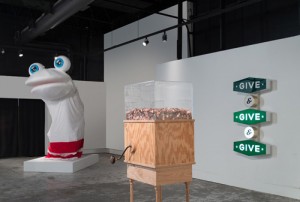
View of “We’ll All Make Out Better Than Okay,” 2013. From left to right: Mike Simi, Mr. Weekend, 2010; Blake Fall-Conroy, Minimum Wage Machine, 2008–2010; Steve Lambert, Give and Give and Give, 2012.
“We’ll All Make Out Better Than Okay”
CHARLOTTE STREET FOUNDATION
1000 W. 25th Street
October 25–December 20
A giant white gym sock covering a robotic arm that once functioned in a Detroit auto-manufacturing plant speaks in a deadening monotone to passersby. He talks about what it’s like to become useless and rambles about other topics as well: “My name is Mr. Weekend, and I am an artaholic. I am an infinite loop. I never rest, I only consume.” The installation, Mike Simi’s Mr. Weekend, 2010, hovers over curator Danny Orendorff’s group exhibition, which considers questions about the economic recession, underemployment, the working poor, gentrification, single motherhood, women’s rights, and the grim truths faced by culture workers who operate within an unsympathetic context of advanced capitalism.
Steve Lambert’s Give and Give and Give, 2012, a custom-made vintage neon sign fashioned with those three words and two ampersands, lights and dims in turn, numbing the mind. As alluring yet empty as the slick advertisements fashioned by Don Draper in Mad Men, it is simultaneously as cold, uninviting, and unforgiving as the steel plates in one of Donald Judd’s Stacks. In “Wall of Letters: Necessary Reminders from the Past for a Future of Choice,” 2006, Andrea Bowers takes real paper letters from the archives of a 1960s California women’s health activist group pre–Roe versus Wade, redrawing them to scale, in order to consider connections between the past and present of ongoing feminist activism.
Afro-feminist collective Honey Pot Performance’s video Price Point, 2013, is a documentation of the group’s energetic ethnographic theatrical performance, which uses humor and aplomb to discuss the realities of ordinary people living in an unstable economic system and asks what it means to work and to be valued. Google Google Apps Apps, 2013, a video by drag performer Persia featuring the performance group Daddies Plastik, offers glitchy, effectively useless Street View captures of San Francisco’s Mission District, which is in the midst of gentrification by Silicon Valley’s young tech elite. Theaster Gates’s engraved marble slab Bank Bond, 2013, one in an edition of one hundred custom-made works, was originally part of a now-derelict 1920s bank in Chicago’s Woodlawn neighborhood. Retrieved and repurposed, it now sells for $5,000, providing proceeds that will build a thriving cultural hub that offers a vision for the future, rather than continuing to symbolize an assessment of the present day’s bleak economic circumstances.
— Alicia Eler
Read the Artforum.com Critic’s Pick here: http://artforum.com/picks/section=us#Kansas City
PERMALINK HERE: http://artforum.com/archive/id=44303
ALL ARTFORUM STORIES HERE: http://artforum.com/contributors/name=alicia-eler



